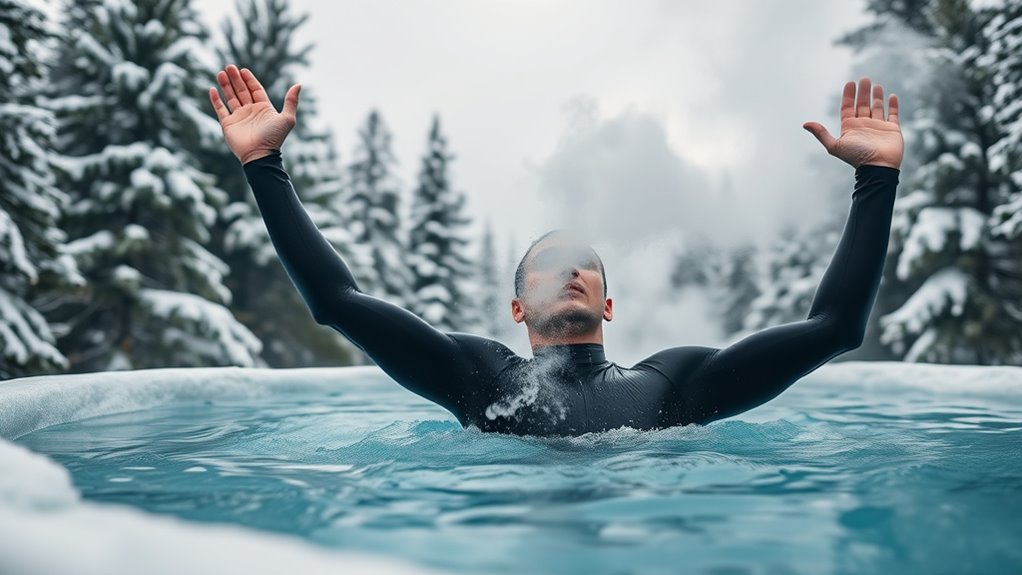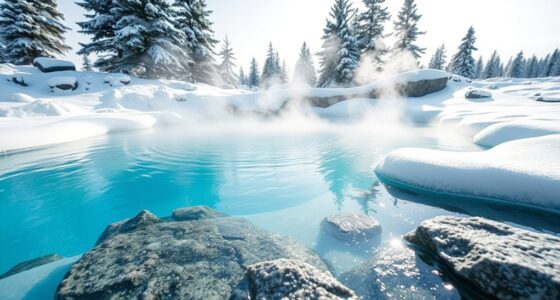Taking a cold plunge can markedly reduce stress and boost mental clarity by activating your body’s natural responses. It triggers the release of endorphins and norepinephrine, helping you feel calmer and more focused. Regular cold immersion also builds resilience, making it easier to handle daily pressures with a clear mind. As you experience these benefits, you’ll discover how your nervous system adapts over time. Keep exploring to learn how to maximize these powerful effects for overall well-being.
Key Takeaways
- Cold plunges activate physiological responses that reduce inflammation, improve circulation, and promote relaxation, aiding stress reduction.
- Regular cold exposure trains the nervous system to handle discomfort, fostering resilience and emotional regulation.
- Immersion in cold water induces alertness and mental clarity by increasing alertness and clearing mental fog.
- Consistent practice enhances long-term stress management by strengthening the body’s stress response and promoting calmness.
- Cold plunges support mindfulness and present-moment awareness, leading to improved focus and mental sharpness.

If you’re looking for a natural way to reduce stress, taking a cold plunge might be just what you need. Immersing yourself in cold water, a practice often called ice therapy, has gained popularity for its ability to boost mental resilience and improve overall well-being. When you plunge into icy water, your body reacts immediately, activating a series of physiological responses that can help you manage stress better. Instead of relying solely on medication or meditation, cold plunges offer a direct, tangible experience that can reset your mind and body.
Discover how cold plunges boost mental resilience and reset your mind naturally.
Ice therapy isn’t just about the shock of cold water; it’s about training your nervous system to handle discomfort and chaos more effectively. As your body adjusts to the chill, you learn to stay calm under pressure—an essential aspect of mental resilience. This mental strengthening carries over into daily life, making you less reactive to stressful situations. Over time, regular cold plunges can help you develop a more composed mindset, enabling you to face challenges with clarity rather than anxiety. The initial discomfort gives way to a sense of achievement and control, reinforcing your ability to stay grounded amid chaos.
Taking a cold plunge also sharpens your mental clarity. When you submerge yourself in cold water, your brain experiences a surge of alertness and focus, partly due to the release of endorphins and norepinephrine. This heightened state of awareness can clear mental fog and improve concentration. Many people report feeling more energized and mentally sharp after just a few minutes in cold water, which can be especially helpful during stressful periods or when you need to reset your mental state. The invigorating nature of ice therapy pushes you to be present, reducing rumination and promoting mindfulness.
Beyond the mental benefits, cold plunges can also enhance your physical health, which naturally supports mental well-being. Cold exposure reduces inflammation, boosts circulation, and improves sleep—all factors that contribute to better stress management and mental clarity. When your body feels healthier, your mind tends to follow suit, making it easier to handle daily pressures. Consistent practice also trains your nervous system to respond more efficiently to stressors, fostering resilience that extends beyond the cold water.
Incorporating cold plunges into your routine might seem intimidating at first, but many find that the mental gains outweigh the initial discomfort. As you develop a habit, you’ll discover that ice therapy becomes a powerful tool for cultivating mental resilience and clarity, helping you navigate life’s stresses with a calmer, more focused mind. Additionally, understanding the physiological responses involved in cold exposure can deepen your appreciation for how it benefits both your body and mind.
Frequently Asked Questions
Are There Any Age Restrictions for Cold Plunges?
Age limitations for cold plunges vary, but generally, it’s safe for most adults. However, safety considerations are vital, especially for children, seniors, or those with health conditions. You should consult a healthcare professional if you have concerns or underlying health issues. Always start with shorter durations and gradually increase exposure to avoid shock or hypothermia. Listening to your body ensures you enjoy benefits safely, regardless of age.
How Often Should I Take a Cold Plunge?
You should aim for a cold plunge routine 2 to 3 times a week to start, as this offers the ideal frequency without overdoing it. Listen to your body and gradually increase the frequency if you feel comfortable. Consistency is key, so stick to your routine to experience benefits like stress reduction and mental clarity. Always consult a healthcare professional if you have underlying health conditions.
Can Cold Plunges Help With Anxiety or Depression?
They say a journey of a thousand miles begins with a single step, and cold plunges could be that step for your mental health. Cold shower benefits include releasing endorphins, which can lift your mood and reduce anxiety or depression symptoms. While cold plunges alone aren’t a cure-all, incorporating them into your routine may improve mental clarity and resilience, helping you manage stress and emotional lows more effectively.
What Are the Risks of Cold Plunging?
You should be aware that cold plunging carries risks like cold shock, which can cause rapid breathing or heart rate changes, and skin irritation from prolonged exposure to cold water. If you have heart problems or circulation issues, you could be at higher risk. Always start slowly, listen to your body, and consult a healthcare professional to mitigate these dangers and ensure safe cold plunging.
How Does Cold Exposure Compare to Other Stress Reduction Methods?
You might find it amusing that cold exposure, often seen as extreme, actually offers faster physiological responses than some calming methods like meditation. It triggers a rush of adrenaline and endorphins, providing immediate relief. While yoga or deep breathing foster psychological benefits over time, cold plunges deliver quick stress reduction and mental clarity. Its ironic power lies in turning discomfort into calm, making it a surprisingly efficient stress-buster.
Conclusion
Taking a cold plunge is like hitting the reset button on your mind, washing away stress and fog. As you embrace the icy embrace, you’ll find your thoughts clearer and your mood lighter, like a mountain stream after a storm. It’s a simple yet powerful way to boost mental clarity and reduce stress, turning a chilly dip into a invigorating escape. Immerse yourself today, and let the cold awaken your mind’s true potential.









